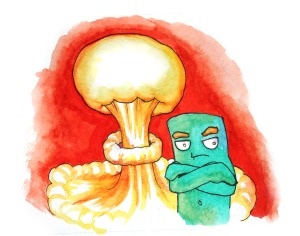
Be your size, no bigger, no smaller....
Size is all-important in a family. I’ve seen many families where the children are “bigger” than the parents. The children’s needs, wants, and desires appear to determine almost everything. The parents’ needs are habitually ignored while the desires of the children are the parents’ marching orders. Of course parents willingly sacrifice for their children, this is part of what it means to be a parent, but in families with “super-sized” children, the imbalance becomes burdensome.
I have seen children pitch a fit, stamp and storm – when a parent makes a legitimate request of the child, or has to alter a minor plan, or must pursue a detour, which the child perceives as hindering his or her freedom, creativity, rights, or friendships.
Such toxic parent/child binds, where the strong emotions of a child brings fear to the parent, can drain all the enjoyment out of family life.
When a mother or a father sees the light (acknowledges his or her indulgence of the child, can see the child is unpleasant to be around) and tries to bring the child down to an appropriate size, the child will understandably resist. Resistance can become ugly. “Un-spoiling” a child is no easy task: it is better not to worship children in the first place.
Bringing children “down to size” sounds harsh, even cruel. It sounds like something that should be against the law. On the contrary, allowing, or grooming children to be too big (dominant, controlling, demanding) is where the harshness and cruelty really lies. If you have discerned that your son or daughter is too big, and that you are too small, it is probably not a good idea to attempt the imposition of all manner of restrictions and changes to “bring him down to size.”
I would suggest that ALL the adults (biological, step parents, grandparents who foster the super-sizing of the child or cooperate with it) have an extended face-to-face conversation about your mutual issue. Depending on the magnitude of the problem this might take several hours, in which case I’d suggest you spread your meetings over several weeks so people have a chance to think things through. Talking openly about these matters is often half the battle – and as you have probably guessed, it is quite a battle.
Implementation of the strong, caring principles that result from your conversations (and the success of what you decide to implement) will pivot on the age of the child, upon how “late” the parents “catch” it, and upon the adults’ unified ability to stay the course. It is my experience that one or two adults will not possess the ability to follow through with the best made approaches – their threshold of pain for the child is too low. But, as I said, it is not easy to un-spoil a child; the fact that children get too big in the first place is riddled with meaning.
Dads and moms (not only children!) can be super-sized too, but it usually only one per family unit. A super-sized dad (demanding, dominant, controlling) usually requires a wife to be super-small (submissive, voiceless, fearful). The really deceptive nature of this kind of family is that a “small” mother and a “big” father are often praised as the “biblical” order for the family – something I have even heard preached as if it is something for which to strive!
A super-sized dad (I’ll consider mothers later) is quite easily identified: he usually gets his own way, he sulks and stamps and steams if his authority is resisted, and he plays the “hurt puppy” when not duly honored. He will pull out the “big guns” on a regular basis (threatening, withholding, colluding, and “The Bible says”) if his will is threatened. Occasionally I’ve seen a super-sized dad humble himself. But, if it is tough to un-spoil a child, you can only imagine how difficult it is to get a self-centered parent to discover authentic humility.
A way out of this hurtful and debilitating trap is for individual family members to work on getting a voice (this is a way to increase in size) and resist placating the persistently controlling, demanding parent.
Many mothers are too small, and too busy. They have so yielded to the demands of mothering, of being a wife; of trying to balance an imbalanced world on two frail shoulders, it has caused mother-shrinkage. They have shrunk, not from a natural process of aging, but from the pressures of trying to be perfect, of trying to make their world work perfectly, of keeping children in line, their husbands sober, responsible, or happy.
I have discovered there is no stopping a woman who is hell-bent on disappearing into a life of “sacrifice” and “service.” The best approach is to get out of her way until they sees the light or, sadly, she collapses in sheer exhaustion. When a woman equates some twisted belief about humility and self-imposed punishment with selflessness, there is no reasoning, no convincing, that will successfully deliver her from herself.
Anxiety drives people and everyone “benefits” when mother becomes the High Priest of Perpetual Service and Motion – until it all falls apart. Then, if she doesn’t get wise, caring help, she will probably bury herself in a boatload of guilt.
When family members are all the appropriate size there is mutuality among the adults and cooperation among the adults and the children. The give and take of daily life becomes more and more joyful as each person fills his own shoes, stays out of the way of the growth and health others, and lives out his or her part of the family bargain. You will notice that:
1. Who is “in charge” or who is “the boss” or who is “the spiritual leader” becomes irrelevant.
2. Love and cooperation trump all.
3. Individual family members assume a high degree of appropriate personal responsibility.
4. Over-functioning (doing things to help others avoid responsibility) and under-functioning (expecting others to save you from yourself) are avoided.
5. People are afforded a wide berth for learning and growth.
6. Forgiveness and grace are easily given and readily received when things go awry.
7. Individuals stand up for themselves without hurting others.
8. Spontaneity is highly valued.
9. Humor is ever-present, even in the toughest of circumstances.
10. Dialogue and insight, shared among family members, is embraced rather than avoided.







